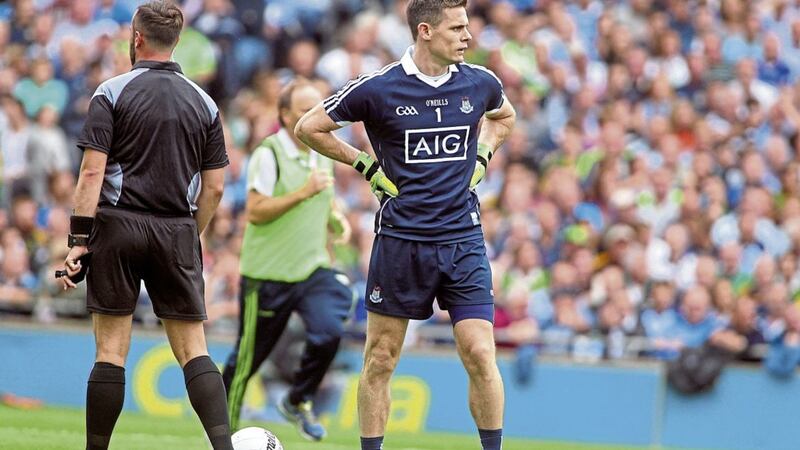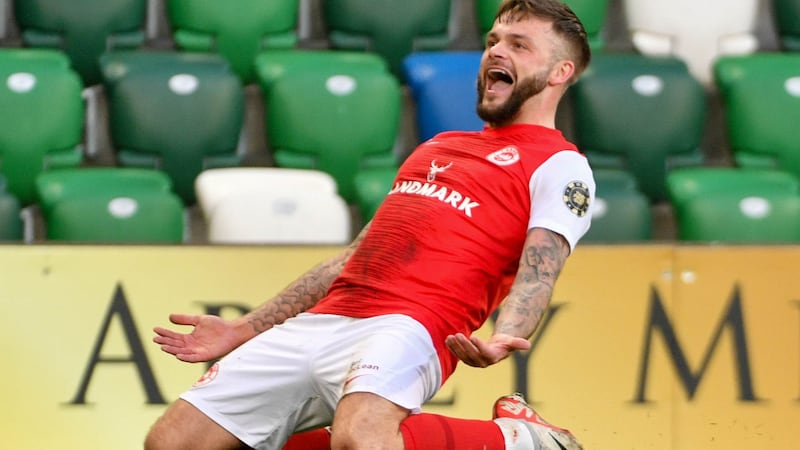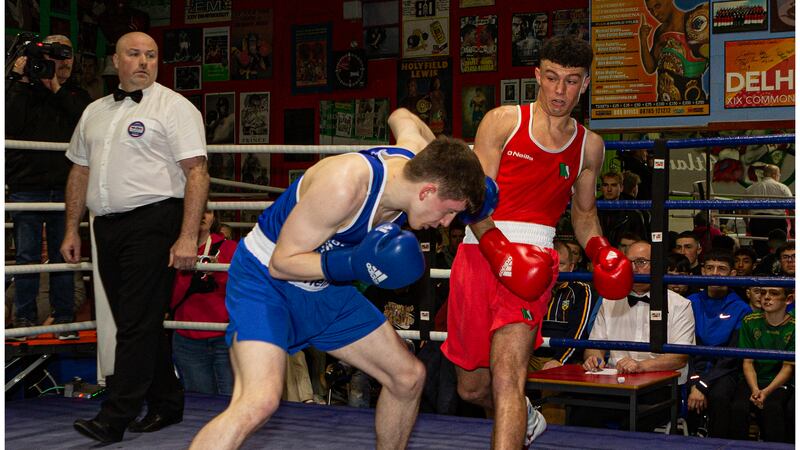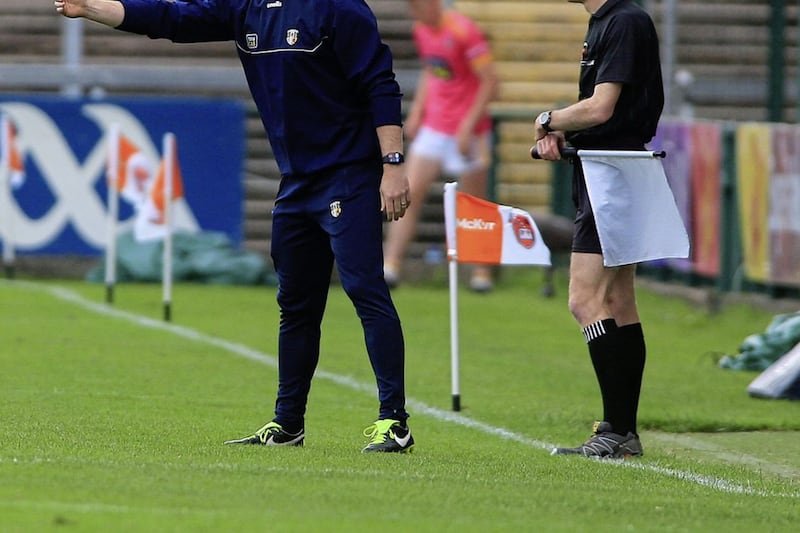TYRONE v Dublin in next weekend’s All-Ireland SFC semi-final is one of the most tantalising clashes of the last 10 years.
One area that is really getting everyone talking is the tactical battle.
Mickey Harte, in preparation for the biggest games, always looked at both ourselves and the opposition from each other’s viewpoints.
As the biggest games panned out, we rarely found ourselves wrong-footed or in a situation on the pitch we hadn’t considered. It was this fostering of a whole team of tactically and situationally aware players that was one of Mickey’s managerial strong points.
The Dublin match is just the sort of one Mickey will have had in the back of his mind for a few years so I can only imagine the Tyrone team’s preparation will be exceptional.
There are many things to be considered. Among the biggest decisions will be regarding kick-out strategy, who and how many Dublin players need ‘tagged’ and Dublin’s defensive approach.
In terms of kick-out strategy, Mr Cluxton has essentially revolutionised both the position and arguably the game.
To use Darragh O Se’s great phrase, hammer the hammer, and Stephen Cluxton is Dublin’s hammer.
Being a goalie, especially with his mental strength, he is uniquely difficult to ‘hammer’. His kick-outs are almost impervious but they remain the way to both unsettle him and Dublin.
When their kick-outs are upset Dublin look a completely different team. They look vulnerable.
Teams have tried a zonal approach, but Cluxton is so accurate that even a few metres of space are enough for him to pin his man, so this strategy is almost impossible to pull off.
Similarly, with going man-to-man tight, as in a high press, the Dublin runs are so effective that, combined with Cluxton’s accuracy and speed of restart, even being touch tight often isn’t enough. It’s also high risk as if Dublin win possession you are more exposed at the back.
A team like Tyrone, with their combination of footballing ability and athleticism – especially if they push an extra man up – can cause turnovers. The key is to realise, depending on how an attack finishes, how many men are up the pitch and where they are, and that should decide whether it is on or not.
There is nothing worse than a team trying to go high-press but because of men out of position a man is left free and they are caught in no-man’s land.
Tyrone will concede many kick-outs and keep tight at the back, letting Dublin come on to them but, when they see their chance, they’ll go hard on the high press.
They have the players and intelligence to do it and if they manage it once, that means lots of payers are up the pitch and they should be set up to repeat the dose and get Dublin pinned in, something they are not used to at all. That’s a position from which Tyrone can make hay.
At the other end of the pitch a key Tyrone decision will revolve around who gets ‘tagged’ (God forbid I would sound out of touch by calling it ‘marked’).
The issue here is that Dublin, unlike every other team in the country, do not have ‘key’ forwards.
Interestingly, when people look at Tyrone they see this as a weakness. Looking at Dublin it is a reason they are so hard to stop.
Paul Mannion, Dean Rock, Paddy Andrews, Bernard Brogan, Diarmuid Connolly, Ciaran Kilkenny, Kevin McManamon, Con O’Callaghan and Eoghan O’Gara. Who do you tag? Every one is a ‘shooter’ in their own right, able to score from the minimal of space.
Those in the inside line, as Dublin are attacking, will always need picked up. After that Tyrone must stick to their shape and go zonal as I think if you are tagging any more than two or three players the zonal system will break down.
Dublin have a few long-range shooters so Tyrone will need to be ready to push out hard and also show their usual discipline in the tackle given Rock’s conversion rate from frees. The fact that Rock hasn’t scored a point from play yet is a central part of the Dublin jigsaw and demonstrates his particular value as a place kicker. In a Mexican stand-off, which this game could become, Tyrone can’t afford to let him be the sniper.
Dublin’s big tactical decision is over their general approach. In his first few years in charge, Jim Gavin spoke often of the Dublin style of play and sticking with Dublin traditions of playing open, attacking football.
This, of course, was lapped up by the media but was a facade. When they go defensive, as they did in their League match against Derry in 2015, somehow it is blamed on the opposition that Dublin had 13 or 15 men behind the ball.
Sunday’s match poses an interesting scenario for Gavin and one that Mickey Harte has had to confront a long time ago.
Mickey always railed against any semblance of blanket defending in my time from minor right up through to senior.
In many video review sessions, fellas were slaughtered for being seen to just jog back ‘to be seen to be back rather than doing anything specific’.
Everyone had to try to turn that ball over as high up the pitch as we could, quite the opposite of the blanket.
Mickey, having been foiled by the zonal tactic approach of Dublin in 2010 and famously by Jim McGuinness’ Donegal on numerous occasions, was forced to change his approach.
Gavin will know that Tyrone do not carry the same danger up front as Dublin and are more reliant on counter-attacking. In this scenario, conceding the Tyrone kick-out and going defensive is a strategy that
would blunt Tyrone’s primary weapon.
Dublin have the talent to outplay Tyrone in a traditional game but, if you want to stop Tyrone, Dublin would have to let the mask slip and show themselves to be a pragmatic, win first worry about the aesthetics later, type of team.
If they stick to their professed traditional attacking style, tactical vanity will have given Tyrone their chance.
As Mike Tyson said, everyone has a plan until they get punched in the mouth.
Given the shifting sands that games naturally become, it will be the team able to adapt best that will win the tactical battle.
Ironically, and thankfully however, football has never been a game won on the tactics board.
Tactics will be the undercurrent, but the forgotten cliché that is ‘will to win’ can be the clincher. Next week I will look at why this ‘cliché’ is Tyrone’s secret weapon and must be unleashed.








